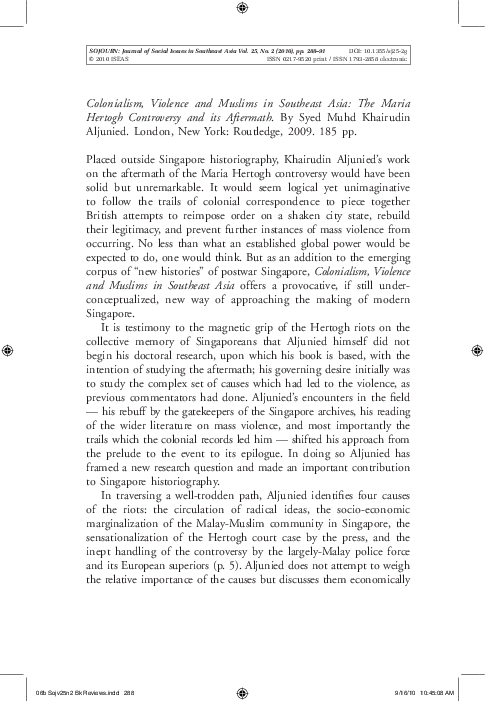SOJOURN: Journal of Social Issues in Southeast Asia Vol. 25, No. 2 (2010), pp. 288–91
DOI: 10.1355/sj25-2g
© 2010 ISEAS
ISSN 0217-9520 print / ISSN 1793-2858 electronic
Colonialism, Violence and Muslims in Southeast Asia: The Maria
Hertogh Controversy and its Aftermath. By Syed Muhd Khairudin
Aljunied. London, New York: Routledge, 2009. 185 pp.
Placed outside Singapore historiography, Khairudin Aljunied’s work
ontheaftermathoftheMariaHertoghcontroversywouldhavebeen
solid but unremarkable. It would seem logical yet unimaginative
to follow the trails of colonial correspondence to piece together
British attempts to reimpose order on a shaken city state, rebuild
theirlegitimacy,andpreventfurtherinstancesofmassviolencefrom
occurring. No less than what an established global power would be
expectedtodo,onewouldthink.Butasanadditiontotheemerging
corpusof“newhistories”ofpostwarSingapore,Colonialism,Violence
and Muslims in Southeast Asia offers a provocative, if still underconceptualized, new way of approaching the making of modern
Singapore.
It is testimony to the magnetic grip of the Hertogh riots on the
collective memory of Singaporeans that Aljunied himself did not
begin his doctoral research, upon which his book is based, with the
intentionofstudyingtheaftermath;hisgoverningdesireinitiallywas
tostudythecomplexsetofcauseswhichhadledtotheviolence,as
previous commentators had done. Aljunied’s encounters in the field
—hisrebuffbythegatekeepersoftheSingaporearchives,hisreading
of the wider literature on mass violence, and most importantly the
trailswhichthecolonialrecordsledhim—shiftedhisapproachfrom
the prelude to the event to its epilogue. In doing so Aljunied has
framedanewresearchquestionandmadeanimportantcontribution
to Singapore historiography.
In traversing a well-trodden path, Aljunied identifies four causes
of the riots: the circulation of radical ideas, the socio-economic
marginalization of the Malay-Muslim community in Singapore, the
sensationalization of the Hertogh court case by the press, and the
inept handling of the controversy by the largely-Malay police force
anditsEuropeansuperiors(p.5).Aljunieddoesnotattempttoweigh
therelativeimportanceofthecausesbutdiscussesthemeconomically
06bSojv25n2BkReviews.indd288
9/16/1010:45:08AM
�Book Reviews
289
(criticswouldsayperfunctorily)inthefirstchapterofthebook.He
thenmovesontothebulkofhisthesisontheentanglementsbetween
the British regime and Muslim community as both sides responded
to the riots in their own ways.
Theaftermathiscoveredinfiveneat(perhapstooneat)andrichly
detailed chapters, which roughly move from more immediate and
reactive measures to policies of wider and more ambitious impact.
The chapter titles are taken from the five forms of colonial policy,
and although Aljunied maintains an intention to tell the story of
howMuslimsubalternsutilizedthe“weaponsoftheweak”(p.5),he
succeedsbetterincertainsectionsthaninothers.Inthefirstchapter
on British proscription, Aljunied unravels its coercive dimension
and abuse of power. This presents history empathetically from the
Muslim perspective but does not necessarily accord them agency.
Thesecondchapteronsurveillancehighlightstheexcessiveparanoia
of the colonial mind; in the narrative, the British emerge as both
hard-headed and somewhat inept rulers.
The third chapter on self-criticism exposes the limited nature
of the investigations made to apportion responsibility for the riots.
Here,onerealizeshowwellAljuniedhasdepartedfromthecustomary
fixation with the causes; in discussing the 1951 Report of the
CommissionofInquiry,akeydocumentonthecauses;Aljuniedhas
rightlytreateditasadiscursivepartoftheBritishpolicyofrestoring
theirpoliticallegitimacy.Withthefourthchapter,thebookbeginsto
explore the reconstructive side of the British response by examining
attempts to rebuild the collaborative political and social networks
which had served them well before the riots. Aljunied shows how
the colonial regime necessarily built on the autonomous work of
community leaders and organizations, which accords some degree
of agency to non-governmental actors.The most important chapter
perhaps is the final one on reform, where Aljunied discusses British
measurestorestructurethepoliceforceandbettermanagethesocial
issues of education, marriage, and adoption of children.
InfocussingontheBritishandMuslimresponsestotheHertogh
riots, rather than the causes, Aljunied has attempted to decentre
06bSojv25n2BkReviews.indd289
9/16/1010:45:08AM
�290
Book Reviews
“crisis”asadefiningtropeinthehistoriographyofpostwarSingapore.
Asherightlypointsout,theviolenceof1951hasbecomeanintegral
partofthe“moralpanic”postureanddiscourseofethnicgovernance
in present day Singapore (p. 1). His emphasis on the aftermath
highlights instead the theme of change and continuity which is a
better fit for explaining Singapore’s momentous postwar history.
The riots precipitated important changes in the course of colonial
governance,someinthesocialarena;thisdemandsthatthehistorian
crosses over from political to social history, as Aljunied has done in
the crucial final chapter on reform. Aljunied also demonstrates how
theriotshelpeddefinethepoliticalcareersandperspectivesofTunku
Abdul Rahman and Lee Kuan Yew, and social and political life in
Singapore and Malaya in general (pp. 129–30).This underlines the
historicalcontinuitiesbetweenthelatecolonialandearlypost-colonial
periods,whichinsomeimportantwaysoughttobeviewedasasingle
continuous era of political and societal transformation.
At the same time, the theme of change and continuity suggests
thattheconceptoftheaftermathisinadequateforfullyunderstanding
the Hertogh riots. The “aftermath” still stands in the shadow of
the causes, limited to the period immediately after the event,
while its stories are primarily told from the British vantage point.
AlthoughinorganizinghischaptersAljuniedappearstoprivilegethe
reconstructive policies, he does not undertake to further assess their
respectiveimportance.Moreimportantly,theHertoghcontroversycan
have consequences which lay beyond the temporal and conceptual
framesoftheaftermathandbeyondthecontiguousBritisharchives.
Thebook,forinstance,woulddowellwithaconcludingchapteron
howtheriotshavecometoattaintheiriconicstatusincontemporary
Singapore.
Onemaycomplainthatitispossibletoattachtoomuchsignificancetoasingularevent.Itisinsightful,however,tore-examinethe
landmarkeventsofpostwarSingaporenotsolelyascrisesasanearlier
generation of scholars has done, but as triggers for transformation
and catalysts for change. This will tell us, as Colonialism, Violence
andMuslimsinSoutheastAsiahasdone,somethingaboutthenature
06bSojv25n2BkReviews.indd290
9/16/1010:45:08AM
�291
Book Reviews
of governance in Singapore and the weight of the colonial legacy.
Thefive-prongedBritishresponsetotheHertoghriots,coveringthe
majorpolicyareasofconcern,providesaforetasteofthecomprehensive planning and making of post-colonial Singapore in subsequent
decades.Thepartialfailureoftheresponse,too,offersanimportant
insight into how subalterns and minorities confronted the emerging
contoursofmodernityinthepostwarperiod.Inthislight,Aljunied’s
effort is deeply original in widening the terms of historical inquiry
and seeking a new path into the city state’s recent past.
LOH Kah Seng
Loh Kah Seng is a Visiting Fellow at the Institute of Southeast Asian Studies.
06bSojv25n2BkReviews.indd291
9/16/1010:45:09AM
�

 Kah Seng Loh
Kah Seng Loh